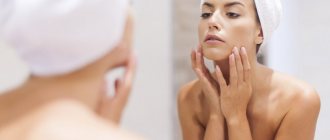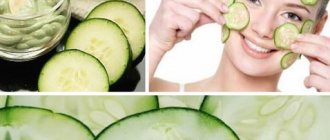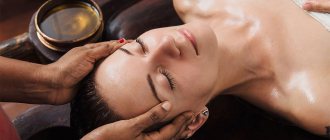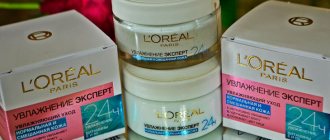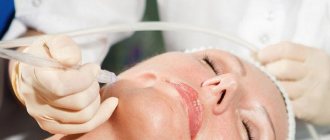Causes of insufficient hydration
Dehydrated skin is often confused with dry skin. In both cases, the skin lacks moisture, but these are different concepts:
- Dry skin suffers due to impaired barrier properties. It lacks moisture and lipids, so it constantly dries out. This is a genetic trait that cannot be changed.
- Dehydrated skin also lacks water, but this occurs due to changes in the intercellular matrix of the dermis. This problem occurs with normal, combination or oily skin. However, this is not a congenital condition, so it can be eliminated.
Skin hydration largely depends on the condition of the hydrolipid barrier. It consists of water, fatty acids and in normal condition protects the skin from the effects of negative factors. However, if its operation is disrupted, the barrier does not absorb moisture well.
The hydrolipid balance can be disrupted for various reasons: from hereditary factors to improper care. In any case, the skin suffers from a lack of moisture, which affects its appearance, causing deep wrinkles and sagging. If the skin is very dry, not only the lipid barrier is deformed, but also the acid mantle, and the pH balance is also disturbed.
Dehydration or dry skin can be caused by many reasons:
- genetics (if we are talking about skin type),
- sleep disturbance,
- unbalanced diet, lack of water,
- lack of vitamins,
- liver and kidney diseases,
- improper functioning of the hormonal system,
- age,
- weather conditions: dry, windy, frosty.
Often, facial skin intensively loses moisture due to poor care. Aggressive means and excessive cleansing, low-quality cosmetics significantly aggravate the problem, disrupting the hydrolipid layer. Therefore, deep moisturizing of the facial skin is very important to carry out correctly, using specially developed products.
Ceramides, which are part of Ceramed skin care cosmetics, help restore and maintain normal water levels in the stratum corneum of the skin, as well as reduce its irritability.
Why is it important
Against the background of an insufficient level of moisture in the skin, the production of collagen and elastin decreases, and its firmness and elasticity sharply decrease.
As a result:
- Wrinkles appear earlier. With age, the sebaceous glands reduce the production of subcutaneous fat. And the sooner you start regularly moisturizing your skin, the later it will show signs of aging.
- Wrinkles that exist become more pronounced. When there is a lack of moisture in the skin, collagen is synthesized less and is destroyed. Wrinkles on dehydrated skin are more noticeable.
- The complexion becomes dull and flaking appears. With insufficient hydration, the skin's protective barrier is disrupted and it becomes susceptible to external irritants. As a result, redness and peeling occur, the skin acquires a gray tint and loses its natural radiance.
- Inflammation develops. Those with oily skin are often convinced that they don’t need moisturizer and actively use drying products. This is the wrong approach. Excessive cleansing can cause even more sebum production, leading to clogged pores and acne.
- Makeup doesn't go on smoothly. With flaking, uneven skin texture and other manifestations of insufficient hydration, it is difficult to apply even makeup. Cosmetics will roll off and highlight imperfections.
Moisturized skin looks well-groomed and smooth
Lifestyle
Lifestyle has a significant impact on skin dehydration. Therefore, it is necessary to follow the regime and sleep at least 7 hours a day. It has been proven that lack of sleep and stress negatively affect the amount of water in cells. At night, the skin recovers better, and lack of sleep reduces the level of hormones that stimulate cell production and skin elasticity.
The presence of bad habits also affects the condition of the skin. Alcohol dehydrates the body and leads to a deficiency of vitamins that are involved in collagen synthesis. Nicotine changes skin color and makes it duller.
Equally important is proper nutrition. The skin reflects the state of the body and reacts if it lacks microelements. You should eat less smoked foods and fast food, and focus on vegetables and fruits. They consist of water, which is so necessary for the skin, and are also rich in antioxidants.
In addition, it is important to consume the optimal amount of fiber: it helps retain water. Eggs, cauliflower, spinach, tomatoes, and potatoes contain fiber.
Water is one of the main components of our lipid barrier and hyaluronic acid, which directly affect skin elasticity. Stay hydrated in hot weather and try to drink at least 1.5 liters of fluid per day.
Mesotherapy
Mesotherapy has long and deservedly occupied a leading position in cosmetology. The essence of the technique is the introduction into the epidermis and dermis using injections of medicinal meso-cocktails,
consisting of vitamins, microelements, low molecular weight unstabilized hyaluronic acid, extracts of medicinal plants. Injections are made to a depth of 1 to 4 mm, so local anesthesia must be used during the procedure.
Of course, it will not be possible to achieve an impressive result from the first procedure, but 5–10 sessions will transform the skin beyond recognition. It will be deeply moisturized, the relief will become more even, small wrinkles will be smoothed out, turgor will increase and skin tone will apparently improve. The only thing worth remembering is that the technique has a cumulative effect, so its maximum effect will be visible after some time.
(c) Pixabay
But, unfortunately, the wonderful effect of meso-cocktails does not last forever. It is recommended to repeat the procedure regularly every six months or year. You should apply for mesotherapy only to trusted clinics or beauty salons with highly qualified specialists. The experience of the staff is extremely important, because complications from the procedure can be significant: allergies, infections, necrosis of the epidermis.
General rules of care
To restore the protective functions of the skin, it is necessary to prevent moisture loss. To do this, you need to restore the protective layer: moisturizers with hyaluronic acid, ceramides, and glycerin are suitable here. Look for creams that are approved by dermatologists; they are unlikely to cause allergic reactions. And don’t forget about the basic rules of care:
- It is important to always cleanse your skin. Even if you have not used cosmetics, you need to wash your face with special milk: during the day, dirt and dust accumulate on your face - an ideal environment for bacteria. Do this carefully so as not to injure the skin.
- When washing your face, turn on warm water: too hot or cold can cause irritation. And under no circumstances use regular soap!
- Moisturizing facial skin at home necessarily includes the use of cream. Use it twice a day: morning and evening. Apply half an hour before leaving the house so that the cream has time to absorb. Gradually gently massage the product into the skin: this way the nutrients will penetrate the cells faster. It is better to use creams that are suitable as a base for makeup.
- At night, the cream should be applied immediately after washing and at least half an hour before bedtime.
If your skin is sensitive, very dry and prone to irritation, then the ultra-moisturizing Cera Cream for face and body will suit it. It is dermatologist approved and hypoallergenic, which means it will not cause irritation. The cream also contains many useful substances:
- A complex of ceramides - key elements of the stratum corneum - will restore the lipid barrier and retain water molecules.
- Aloe vera gel contains components that have an anti-inflammatory effect and enhance cell regeneration,
- Sorbitol is a natural compound that can retain water on the surface of the skin.
Thanks to this composition, the skin is moisturized for 24 hours, the feeling of discomfort and tightness disappears. The cream is quickly absorbed and does not leave a sticky film, and will also be an excellent base for makeup and is suitable for children from three years old.
Hardware mesotherapy
But what to do if the skin needs deep hydration, and mesotherapy is not available, for example, due to high skin sensitivity or fear of injections? There is a solution - this is a non-injection technique. Its essence lies in a similar introduction of meso-cocktails into the deep layers of the dermis, but without punctures, but with the help of special devices.
The advantages of this effect are rapid recovery after procedures, as well as the absence of hematomas, swelling and irritation of the epidermis. Indications for the use of non-injection mesotherapy are similar to the invasive version of the technique. But there are much fewer contraindications, due to the fact that during manipulations there is no violation of the skin.
The procedure does not last long, about half an hour. The number of sessions required to achieve a pronounced effect is usually determined by a cosmetologist, but on average 4 to 10 procedures are required. Another advantage of the non-injection technique is that it can be done in any season of the year. Although cosmetologists still warn about the dangers of excessive solar activity during this period. Therefore, on sunny days it is better to play it safe with a wide-brimmed hat.
The rules of preparation and rehabilitation period are no different from those that must be followed during traditional mesotherapy. It is important to give up alcohol, antibiotics and anticoagulants for several days, not to visit the sauna or bathhouse, gym, and not to sunbathe in a solarium or in the open sun. It is imperative to inform the cosmetologist about all medications taken on an ongoing basis in order to be completely sure that there are no contraindications to the procedure.
Hardware mesotherapy techniques differ in the ways of introducing meso cocktails
into the dermis. This may be exposure to oxygen, cold, electric waves, galvanic current, laser, ultrasound or magnetic waves. The choice of method remains with the specialist. It is selected based on the patient’s needs, skin type and condition.
Hydration for every skin type
Methods for moisturizing facial skin vary depending on the type. To determine it, look at your face without makeup in good light.
- If there are slight peelings and wrinkles around the eyes and lips, tightness and irritation, the skin is dry.
- If you can clearly see pores, inflammation, and your skin shines when you change the angle, you have an oily type.
- If all this appears only in the T-zone (forehead, nose, chin), the type is combined.
- If the face glows and seems healthy, and there is no inflammation, the skin is normal.
Another option to find out your skin type is to cleanse it with a cleanser, then wait a few hours and rub a thin paper napkin over your face. Pronounced spots indicate oily skin, and if traces appear in the T-zone, it indicates combination skin. If there are no marks at all, the skin is dry. Small discharge indicates a normal type.
What should not be done after mesotherapy?
In order for the procedure to be successful and its result to be beyond praise, you must follow some simple rules:
- After visiting a cosmetologist for a day, you need to give up decorative cosmetics (foundation, powder, highlighter, blush),
- refrain from facial massage or face fitness
.
- , it is not recommended to visit the bathhouse or sauna, swimming pool or gym, or drink alcohol for several days
Combined
This type is suitable for dry and sensitive skin. They contain substances that prevent moisture from evaporating: ceramides, hyaluronic acid. Look for creams with soothing plant extracts: cucumber, aloe, chamomile. Vitamin E and light oils in the composition will also have a beneficial effect on the condition of the skin. However, if your face becomes too oily, it is better to apply a cream specifically for the oily type to the problem area.
How does mesotherapy differ from biorevitalization?
(c) Pixabay
Mesotherapy is often confused with biorevitalization. But these are different methods, although they have the same goal - to improve the condition of the skin, make it more hydrated and tightened.
To make the right choice, you need to understand what to expect from each procedure.
Mesotherapy is recommended to be done at the age of 35, as it has a pronounced anti-age effect. Biorevitalization is prescribed after 25 to restore the skin and make it radiant.
The components of the drugs used during the procedures, as well as the methods of their administration, differ. Biorevitalization is performed on the basis of high concentration hyaluronic acid; in meso-cocktails, the emphasis is on polycomposition. The first method involves only an injection method, the second can also be a hardware one.
The result of biorevitalization is visible almost from the first procedure; mesotherapy has a cumulative effect. The frequency is approximately the same: once every six months to a year.
It is worth noting that mesotherapy is somewhat cheaper than biorevitalization. This is dictated by the high cost of high-quality hyaluronic acid preparations. But both methods are quite affordable, so you shouldn’t try to save a couple of thousand rubles per session. The search for cheapness in this case is dangerous because you can fall into the hands of an incompetent specialist or a beginner.
In any case, it is worth choosing a technique not so much based on these factors, but based on the opinion of a qualified cosmetologist who will make decisions based on the objective needs of the patient.
Do I need to take care of normal skin that does not have problems?
Of course, it is necessary, since it is also subject to the aging process. In this case, there are no special recommendations - everything is determined by the condition of the skin, age and other factors.
The main thing is not to delude yourself that healthy skin itself will always look great. She also needs peelings to remove dead particles, beauty injections and Botox to eliminate wrinkles. Other care procedures will also be useful. Protection from ultraviolet rays and frost, adequate nutrition and hydration are also required.
Healthy, beautiful skin is a gift given by nature. Therefore, it must be preserved and increased.
There is no one-size-fits-all approach to skin care. What works perfectly in one case may not work at all in another. Even having accurately determined your skin type, before using any cosmetic products or undergoing procedures, you must consult a cosmetologist at the Center for Aesthetic Medicine. This will allow you to make the right choice.
